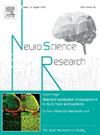早期生活压力和改变的社会行为:跨物种的视角。
IF 2.4
4区 医学
Q3 NEUROSCIENCES
引用次数: 0
摘要
童年和青少年时期的社会关系指导着个体在其一生中如何参与社会关系,而不良经历可以促进促进行为适应不良的生物学改变。事实上,受虐待的儿童更有可能被诊断为行为或情绪障碍,这两种疾病的特征都是社会参与的改变。一个特别值得关注的关键领域是攻击行为,这是许多以奖励处理缺陷为特征的疾病的标志。动物模型在确定压力暴露的短期和长期后果方面是不可或缺的,并表明无论是父母照顾或社会隔离的中断,长期暴露于早期生活压力会增加皮质酮,改变神经递质和神经调节剂的表达,促进下丘脑、海马体和杏仁核的结构改变,影响这些大脑区域与其他奖励相关基质的沟通方式。在此,我们描述了不良的早期生活经历如何影响各种物种的社会行为结果,并强调了与适应不良攻击行为最相关的长期生物学机制。本文章由计算机程序翻译,如有差异,请以英文原文为准。
Early life stress and altered social behaviors: A perspective across species
Childhood and adolescent affiliations guide how individuals engage in social relationships throughout their lifetime and adverse experiences can promote biological alterations that facilitate behavioral maladaptation. Indeed, childhood victims of abuse are more likely to be diagnosed with conduct or mood disorders which are both characterized by altered social engagement. A key domain particularly deserving of attention is aggressive behavior, a hallmark of many disorders characterized by deficits in reward processing. Animal models have been integral in identifying both the short- and long-term consequences of stress exposure and suggest that whether it is disruption to parental care or social isolation, chronic exposure to early life stress increases corticosterone, changes the expression of neurotransmitters and neuromodulators, and facilitates structural alterations to the hypothalamus, hippocampus, and amygdala, influencing how these brain regions communicate with other reward-related substrates. Herein, we describe how adverse early life experiences influence social behavioral outcomes across a wide range of species and highlight the long-term biological mechanisms that are most relevant to maladaptive aggressive behavior.
求助全文
通过发布文献求助,成功后即可免费获取论文全文。
去求助
来源期刊

Neuroscience Research
医学-神经科学
CiteScore
5.60
自引率
3.40%
发文量
136
审稿时长
28 days
期刊介绍:
The international journal publishing original full-length research articles, short communications, technical notes, and reviews on all aspects of neuroscience
Neuroscience Research is an international journal for high quality articles in all branches of neuroscience, from the molecular to the behavioral levels. The journal is published in collaboration with the Japan Neuroscience Society and is open to all contributors in the world.
 求助内容:
求助内容: 应助结果提醒方式:
应助结果提醒方式:


